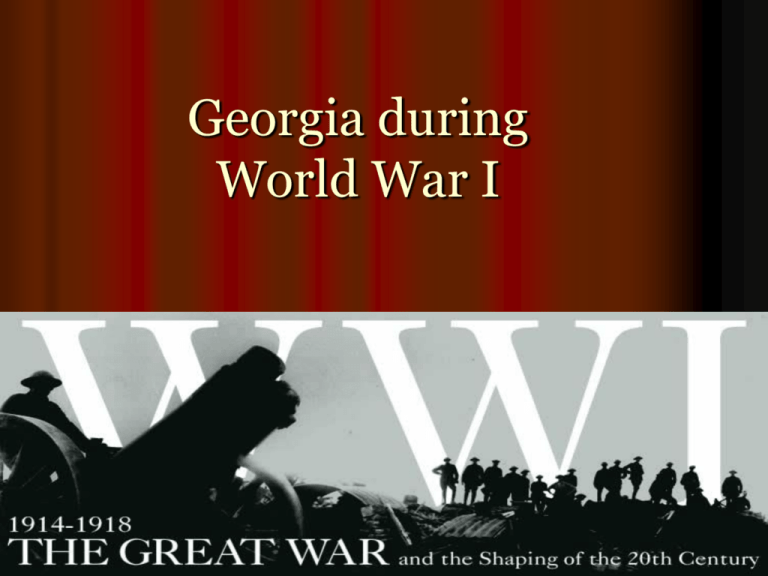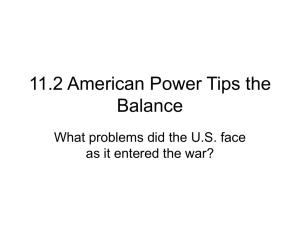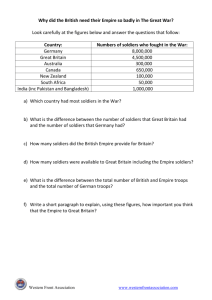Georgia during World War I
advertisement

Georgia during World War I SS8H7d: • Give reasons for World War I and describe Georgia’s contribution. In August 1914, President Woodrow Wilson asked Americans to remain impartial in thought and deed toward the war that had just broken out in Europe. Wilson wanted the United States to exemplify the democratic commitment to peace, but "The Great War" continually challenged the nation's neutrality. President Woodrow Wilson tried to keep America out of World War I, and succeeded in postponing U.S. entry into the war for almost three years. World War I was: **Originally called the “Great War” due to the numerous nations that fought and the great cost of lives and property. **Broke out in Europe in August 1914 between the Allied Powers (Great Britain, France, and Russia) and the Central Powers (Germany, Austrian-Hungary Empire, and the Ottoman Empire) **Over 9 million soldiers died as well as over 5 million civilians died (22 million soldiers injured) ** United States remained neutral until April 1917 ( war had already gone on for 20 months), then joined Allied Powers Causes of World War I ***Assassination of Archduke Ferdinand (heir to throne in Austrian-Hungary Empire) in August 1914 by Serbian nationalists-------- starts a chain of events that lead to war 1. System of Secret Treaties 2. Competition between empires a. Militarism – government with a strong military spirit or policy b. Imperialism – the policy of extending the rule or authority of an empire c. Nationalism - devotion and loyalty to one's own nation 3. Smaller ethnic groups (Serbs, Poles, etc.) wishing selfdetermination “Trench Warfare” was most common method of fighting during war Trench Warfare What war pictures are these similar too? Péronne during the Battle of the Somme, 1916--Robert Carlson. "Don't be angry, just be amazed," was the calling card left by Germans on the destroyed town hall of Péronne after their withdrawal to the Hindenberg Civil War – Sherman’s March to the Sea. Many new weapons of war used for first time during World War I United States’ Involvement during war **United States declared the Neutrality Proclamation at start of war (President Washington urged all future presidents not to be involved in European wars!) **U.S. claimed “freedom of the seas” meaning they can trade with any warring nation **Yet U.S. gets drawn into war: 1. German U-Boats sinking ships 2. Anti-German propaganda (German atrocities) 3. German spies attempt to sabotage U.S. factories 4. Zimmerman telegram (Germany ally with Mexico?) GEORGIA CONTRIBUTIONS TO WORLD WAR I SOLDIERS and WOMEN VOLUNTEERS MILITARY TRAINING CAMPS SUPPLIES Georgia’s Contribution to World War I (SS8H7d) Military Personnel from Georgia Number who served: 100,000 men and women to the war effort Textile Mills How they helped the war effort: Railroads How they helped the war effort: Farms How they helped the war effort: Sewing circles Bond Drives How they helped the war effort: How they helped the war effort: Red Cross What is it? How it helped the war effort: dispatched a ship to Europe loaded with medical personnel and supplies Victory Gardens What were they: How they helped the war effort: Southern Textile Mills How they helped the war effort? •Made material for clothing. How did railroads help the war? Transported weapons 2. Transported soldiers 3. Transported supplies 1. PEACH FARMS • Germans blindsided the Allies with chlorine gas • Once in the body, the yellowgreen gas tortured and killed at the same time, causing asphyxiation, convulsions, panic, and a slow death • When the wind was just right, the Germans would release the gas and it would creep slowly over battlefields, finding its way into trench crevices and soldiers' lungs. • It was something to be feared, but as American chemist James Bert Garner discovered in 1915, it could be subdued with activated charcoal, made from natural fibers such as those found in peach pits. Sewing circles • groups of ladies (some married to military men) • sew items from clothes to flags to raise money for the war effort. War Bond Drives during World War I • a bond is like a loan: the holder of the bond is the lender (creditor), the issuer of the bond is the borrower (debtor), and the coupon is the interest. Victory Gardens during World War I ? During WWI families were encouraged to plant home gardens at their residences or in public parks in order to reduce the pressure on the public food supply brought on by the war effort. **War officially ends on November 11, 1918 (Armistice Day) **The Central Powers lose land and power 100,000 men and women to the war effort





